Question
SAMPLE ERIE PROBLEM Wesley (a citizen of Illinois) made an agreement with Cranmer Co. (an Ohio corporation with its principal place of business in Cincinnati)
SAMPLE ERIE PROBLEM Wesley (a citizen of Illinois) made an agreement with Cranmer Co. (an Ohio corporation with its principal place of business in Cincinnati) under which Cranmer was to build a warehouse for Wesley in Chicago. In the course of construction unresolved disputes arose, which resulted in Wesley withholding payments due to Cranmer. Cranmer refused to do any further work. Wesley hired another builder to complete the job. Wesley sued Cranmer in an Illinois state court seeking damages of $82,000.00, resulting from Cranmer's breach of contract and the resulting delay in the completion of the building. This suit was subsequently properly removed by Cranmer to a federal court in Illinois. After removal Cranmer (1) answered denying that it had breached the contract and (2) counterclaimed for the payments it claimed due it under the contract. Wesley moved to dismiss the counterclaim. The parties agree that if this suit were in the Illinois state courts, as it was prior to removal, Cranmer would not be permitted to assert the counterclaim or any other claim because it had not obtained a contractor's license as required by an Illinois statute providing: "No foreign corporation acting as a contractor in this state shall be permitted to assert any judicial claim in any court of this state, unless first obtaining a contractor's license before performance of any act under the contract." Illinois cases interpreting the statute have indicated that it was intended to protect the public from dishonest and incompetent contractors and have applied the statute both to claims and to counterclaims. The parties do not agree, however, that the same result should follow in view of the fact that the counterclaim is being asserted in a federal court. While conceding that it never obtained a license, Cranmer argues that since the Federal Rules apply to proceedings in a suit after removal, that its counter- claim is allowed both under Federal Rule 17(b) which provides: "the capacity of a corporation to sue or be sued shall be determined by the law under which it was organized. " [under Ohio law Cranmer may "sue or be sued, complain or defend, in any court of this state or any other state or government"] and more
especially under Federal Rule 13{a) which provides that counterclaims that "arise from the same transaction" as the original complaint are "compulsory counterclaims" which may, indeed must, be asserted in federal court or be precluded in any subsequent suit. Federal cases indicate that the "compulsory counterclaim" rule is designed to prevent multiple litigation and promote judicial efficiency in handling of disputes. Wesley argues that under Illinois practice all counterclaims, (whether related or not) are "permissive" and mayor may not-be brought at the option of defendant without risk of preclusion in a subsequent suit. More importantly, since Cranmer concedes it never obtained a contractor's license, it is attempting to assert in a federal court a claim which it could not have asserted in Illinois state court. You are the law clerk for the federal judge. She asks you for a memo on how she should decide this case. Write the memo and be sure to discuss all the issues. She does not like to be overruled!
Step by Step Solution
There are 3 Steps involved in it
Step: 1

Get Instant Access to Expert-Tailored Solutions
See step-by-step solutions with expert insights and AI powered tools for academic success
Step: 2

Step: 3

Ace Your Homework with AI
Get the answers you need in no time with our AI-driven, step-by-step assistance
Get Started


